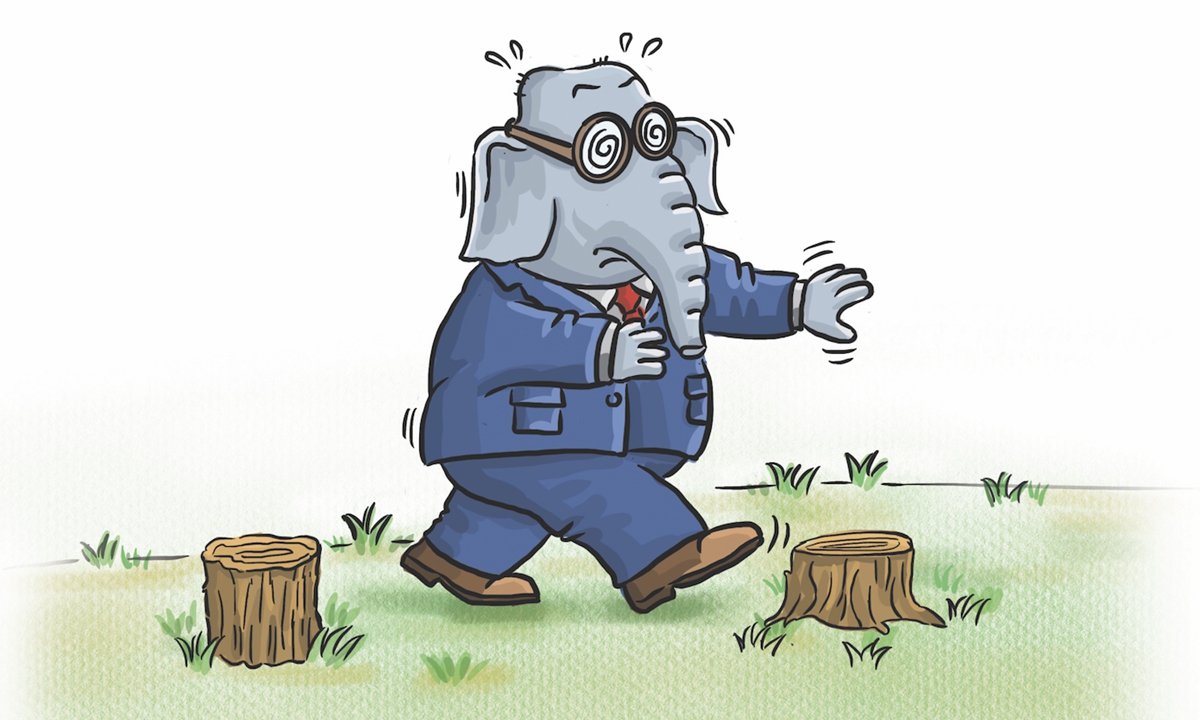Indian economy hurt by New Delhi’s lack of foresight
By Wen Sheng Source: Global Times Published: 2020/10/18 17:32:56

Illustration: Xia Qing/GT
With few signs of success in taming the coronavirus onslaught in India, the government of Prime Minister Narendra Modi is now facing the daunting challenge of bringing Asia's third largest economy back to positive growth. New Delhi has fared the worst among the world's major economies since the COVID-19 pandemic struck our planet.Many analysts believe that the Indian government's refusal to rectify relations with its neighbors, its persistence in rattling sabers along the borders with China and Pakistan, all while banning and placing higher barriers on Chinese businesses operating in India, are fatally misguided, further exacerbating its economic woes.
Consistently confronting China, by stoking more clashes along the border region, and discriminating against Chinese tech companies, or even by intruding in the Taiwan question, will only increase animosity between the two countries.
Hostilities, if not assuaged and diffused by the Modi government, will have long-lasting negative impacts on India's national well-being, as its economic development can hardly be sustained without China's help.
India's GDP plunged 23.9 percent in the April-to-June quarter, the biggest decline since records began in 1996. The Goldman Sachs Group estimates a 14.8 percent contraction in Indian GDP for the year through March 2021.
The IMF's latest estimate predicts the economy will dive 10.3 percent in 2020, compared to the US' negative 4.3 percent contraction and China's positive 1.9 percent growth. By the end of 2021, China's economy, boosted by the strengthening value of the yuan, is expected to be at least 6 times that of India's.
What now upsets the average Indian most is one specific prediction by the IMF: Bangladesh has overtaken India in per capita GDP. Some economists in India are so disgruntled by the currently tattered Indian economy, claiming that Bangladesh surpassing India in per capita GDP is Indians' "colossal downfall" in pursuit of the Modi administration's "$5 trillion by 2024" GDP dream.
An old Chinese idiom says that the conceited reap failure, while the modest receive benefits. India had made some progress since 2010 thanks to its economic liberalization policies, but it lags far behind in investment in basic infrastructure and solidifying its manufacturing industry - two bedrocks for any economy's growth.
In addition, in the past few years New Delhi has done little to address its corrupted and unbalanced social class system, and the severe inequality and income divide between the haves and have-nots. A pandemic the size of the novel coronavirus has only made the country's plight worse.
The Modi government had been too complacent after seeing the Indian economy ride on a 7-9 percent annual growth before 2018, but it failed to acknowledge the hidden problems in the economy.
His administration, blindly and stubbornly, said "no" to China's "Belt and Road Initiative", while all its neighbors - Bangladesh, Sri Lanka, Pakistan, Nepal and Maldives - have cooperated with Chinese enterprises to enhance infrastructure, the launch pads of their respective economies.
After Modi was invited to and feasted at a high-level bilateral meeting in Chengdu, Southwest China's Sichuan Province, in 2018 when the US government hiked tariffs on steel and aluminum from China, India and EU, New Delhi continued to sit on the wall, refusing to condemn trade protectionism. Naturally, relations between the world's two most populous countries cooled from then on. There is another Chinese proverb, saying those who respect others, will be respected too. Clearly, the current Indian government has not earned the Chinese people's respect thanks to its provocative moves on the border.
The world has witnessed how the Indian government bungled its virus response, with the total number of infections shooting to 7.3 million and the death toll now close to 115,000. It is a sad and worrisome scenario that the curve of the pandemic has never been flattened and remains on the rise. Without addressing the health crisis first and foremost, the Indian economy can hardly escape its doldrums.
Indian pundits have highlighted that the political decision making at the highest level in New Delhi, both internal and external, is grossly unwise and lacks foresight and competence. Internally, fiscal stimulus money has failed to reach a majority of the greatest victims of the pandemic. Externally, confrontations with China and Pakistan are offering no economic dividends. In fact, scarce resources are instead being diverted to buy weapons and ammunition.
New Delhi's decision to fan nationalism and ban Chinese apps such as TikTok and WeChat - a move which was later copied by the US government - is adding salt to the economic wounds suffered by Indians. Without the support of the digital-economy, the outlook is bleak.
The author is an editor with the Global Times. bizopinion@globaltimes.com.cn
Posted in: COLUMNISTS